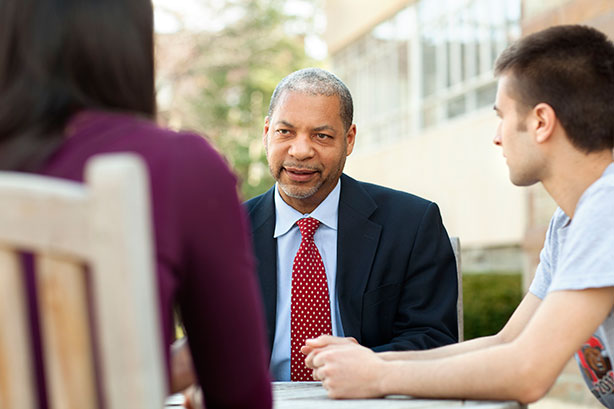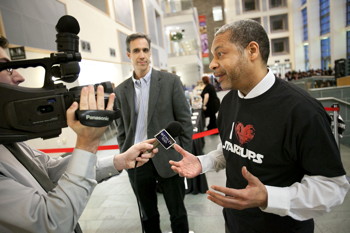DEANS Q&A
Lance Collins

Dean Lance Collins chats with engineering students Julie Wang (electrical and computer engineering), left, and Nicholas Chmelev (civil and environmental engineering), both Class of 2014.
What's one thing that most outsiders don't understand about the College of Engineering?
I think the stereotype of the engineer is that we're a bunch of nerdy people in the background, keeping the lights on and things working. That's just false. I think the engineer is the creator, the creative force behind innovation, behind the way that our world keeps advancing. That is the new reality. It's an evolution, but a pretty substantial one. Over the course of my career, I have seen engineers increasingly as the leaders, and not just the group providing the mix of expertise required to keep things going.
There were some early critics of Cornell's bid to win the New York City tech campus, a contest you played a large part in winning for the university. Some people are still worried about its potential effect on the Ithaca campus.
Because of the heightened awareness of the Cornell Tech campus, we have actually seen a much higher level of excitement for the College of Engineering as well. More alumni are giving, and more students are applying to the Ithaca campus. We've set records in terms of philanthropy over the last couple of years.
I interact with a tremendous number of alumni as well as with faculty and students, and there is an incredible level of excitement among the alumni, about the tech campus and what this means for Cornell as a whole.
Will Cornell Tech skew things toward engineering for money, for business, rather than for the greater good?
The greater good will always be served by taking technology out of the laboratory and putting it into a product that can be sold. Even commercial activities can be driven by all sorts of interests.

Collins with Dan Huttenlocher, then dean of the Faculty of Computing and Information Science (now dean of Cornell NYC Tech), at the inaugural Startup Career Fair held in Duffield Hall Atrium in February 2012. See larger image
For example, one of my colleagues, professor Brian Kirby, has developed a microfluidic device that allows you to take the blood of someone with prostate cancer and lets you separate the cancer cells from all the other cells, which potentially allows the urologist to determine and treat the precise type of cancer that person has without doing an invasive procedure. The technology works reliably in the laboratory, but if you don't actually commercialize it into an easy-to-use system, then no physician will ever use it and no patient will ever benefit from it. Setting something like that up in the lab is just enormously difficult, and the average urologist is not likely to go through that trouble. So the technology benefits no one unless it is commercialized.
What have you learned from the other deans, with whom you meet weekly?
The meetings have been a pleasant surprise: We collectively work as a team for the whole university. I thought, when I first became dean, that that was the responsibility of the president and the provost, without realizing that it was really the leadership team, consisting of the president, provost, the deans and the vice presidents who collectively work together to figure out where the university is going. And we've gone through a pretty difficult time, arguably the worst economic downturn in close to 100 years. So that required incredible levels of stewardship and incredible levels of selflessness. You can't simply be the dean of engineering under those conditions. You really have to be a dean who is servicing the whole university. So I learned that we, as a group, work for the benefit of the whole institution, and sometimes that requires that our vision extend beyond the boundaries of our respective colleges.
What are the major areas of growth and change for the College of Engineering?
We're investing in growing our biomedical engineering department. This department was created in 2005 and has rocketed upward. It is currently ranked among the top 15 to 20 departments in the country, which in that short amount of time is a meteoric rise. It is a group of very young, very talented faculty who, along with some outstanding senior colleagues (including Mike Schuler, the founding chair of the department), have been guiding its growth in spectacular fashion. While biomedical engineering is the core, there are a significant number of faculty members in the other engineering departments contributing to the overall bioengineering effort. This is one of the significant investment areas for the college.
A second major investment area is energy. Under the Atkinson Center for a Sustainable Future, there are the three "E's": energy, environment and economic development, and the energy component to a large extent, but not exclusively, lies in the College of Engineering. We have the Energy Institute, which is now being run by Jeff Tester, the David Croll Professor of Sustainable Energy Systems. We serve as the focal point of energy research across the campus, and we plan to expand those activities. We're very interested in renewable energy such as wind energy, wave energy, solar energy, as well as more traditional, fossil-fuel-based energy sources. We're also interested in the distribution of energy. It's one thing to create it; it's a completely different thing to get it to where you need it, when you need it.
Tell a bit about yourself when you leave the office, at home, and your other interests?
My family is most important to me. My wife, Sousan, a nurse by training, is a stay-at-home mom to our 12-year-old daughter, who has a passion for dance and is also a terrific flute player. I'm happy to see that she does have a math aptitude that maybe takes a little after her dad. So we're trying to make sure she keeps all those options open, but I'm not the kind of dad who says, "You've got to be an engineer to make me happy."
I was an athlete when I was in high school on Long Island. I ran track and played soccer. Now, in my crazy life as a dean, my sporting activities have evolved into spinning classes several times a week.
The DeanLance R. Collins, the Joseph Silbert Dean of Engineering At Cornell since 2002 Dean since July 2010 Area of Expertise: Fluid mechanics, with a special focus on turbulence in clouds The College of EngineeringPopulation: 236 full-time faculty members, 2,903 undergraduates, 1,705 graduate students Major areas of future growth: bioengineering; energy; advanced materials and complex systems; network science and computation. Endowment: $523 million (as of June 2012) Cornell Now campaign goal and amount raised so far: $185 million/$95.9 million (as of April 2013) |
<<View entire story as one page>>